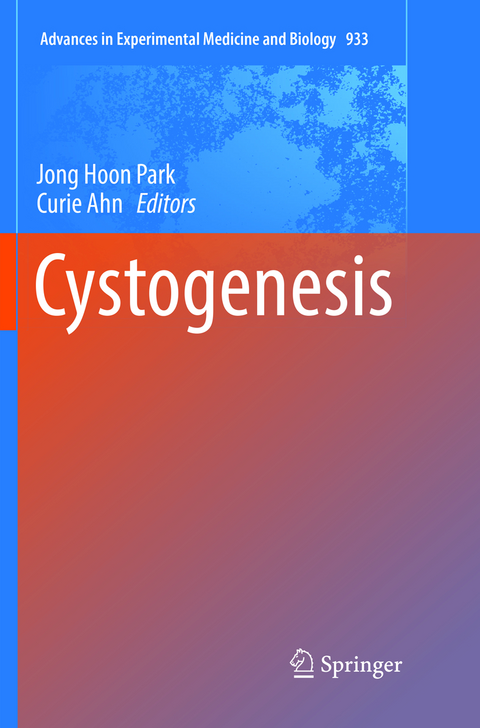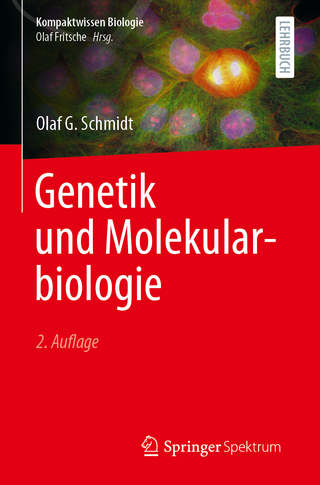
Cystogenesis
Seiten
2018
|
Softcover reprint of the original 1st ed. 2016
Springer Verlag, Singapore
978-981-10-9511-5 (ISBN)
Springer Verlag, Singapore
978-981-10-9511-5 (ISBN)
Autosomal Dominant Polycystic Kidney Disease (ADPKD) is a highly prevalent hereditary renal disorder in which fluid-filled cysts are appeared in both kidneys. In human ADPKD, the age at which renal failure typically occurs is later in life, however no specific targeted medications are available to cure ADPKD.
Autosomal Dominant Polycystic Kidney Disease (ADPKD) is a highly prevalent hereditary renal disorder in which fluid-filled cysts are appeared in both kidneys. Main causative genes of ADPKD are PKD1 and PKD2, encoding for polycystin-1 (PC1) and polycystin-2 (PC2) respectively. Those proteins are localized on primary cilia and function as mechanosensor in response to the fluid flow, translating mechanistic stimuli into calcium signaling. With mutations either of PKD1 or PKD2, hyper-activated renal tubular epithelial cell proliferation is observed, followed by disrupted calcium homeostasis and aberrant intracellular cyclic AMP (cAMP) accumulation. Increased cell proliferation with fluid secretion leads to the development of thousands of epithelial-lined, fluid-filled cysts in kidneys. It is also accompanied by interstitial inflammation, fibrosis, and finally reaching end-stage renal disease (ESRD). In human ADPKD, the age at which renal failure typically occurs is later in life, however no specific targeted medications are available to cure ADPKD. Recently, potential therapeutic targets or surrogate diagnostic biomarkers for ADPKD are proposed with the advances in the understanding of ADPKD pathogenesis, and some of them were attempted for clinical trials. Herein, we will summarize genetic and epi-genetic molecular mechanisms in ADPKD progression, and overview the currently available biomarkers or potential therapeutic reagents suggested.
Autosomal Dominant Polycystic Kidney Disease (ADPKD) is a highly prevalent hereditary renal disorder in which fluid-filled cysts are appeared in both kidneys. Main causative genes of ADPKD are PKD1 and PKD2, encoding for polycystin-1 (PC1) and polycystin-2 (PC2) respectively. Those proteins are localized on primary cilia and function as mechanosensor in response to the fluid flow, translating mechanistic stimuli into calcium signaling. With mutations either of PKD1 or PKD2, hyper-activated renal tubular epithelial cell proliferation is observed, followed by disrupted calcium homeostasis and aberrant intracellular cyclic AMP (cAMP) accumulation. Increased cell proliferation with fluid secretion leads to the development of thousands of epithelial-lined, fluid-filled cysts in kidneys. It is also accompanied by interstitial inflammation, fibrosis, and finally reaching end-stage renal disease (ESRD). In human ADPKD, the age at which renal failure typically occurs is later in life, however no specific targeted medications are available to cure ADPKD. Recently, potential therapeutic targets or surrogate diagnostic biomarkers for ADPKD are proposed with the advances in the understanding of ADPKD pathogenesis, and some of them were attempted for clinical trials. Herein, we will summarize genetic and epi-genetic molecular mechanisms in ADPKD progression, and overview the currently available biomarkers or potential therapeutic reagents suggested.
Part I ADPKD Overview.- Chapter 1 Recent Trends in ADPKD Research.- Chapter 2 Genetic Mechanisms of ADPKD.- Part II Cystogenesis Mechanisms.- Chapter 3 Cell Proliferation and Apoptosis in ADPKD.- Chapter 4 Inflammation and Fibrosis in ADPKD.- Chapter 5 Functional Study of the Primary Cilia in ADPKD.- Chapter 6 Epigenetic Regulation in Cystogenesis.- Part III Therapeutic Approaches and Diagnostic Markers for ADPKD.- Chapter 7 Validation of Effective Therapeutic Targets for ADPKD using Animal Models.- Chapter 8 Diagnostic Evaluation as a Biomarker in Patients with ADPKD.- Chapter 9 Clinical Trials and a View toward the Future of ADPKD.
| Erscheinungsdatum | 27.08.2018 |
|---|---|
| Reihe/Serie | Advances in Experimental Medicine and Biology ; 933 |
| Zusatzinfo | IX, 126 p. |
| Verlagsort | Singapore |
| Sprache | englisch |
| Maße | 155 x 235 mm |
| Themenwelt | Medizin / Pharmazie ► Medizinische Fachgebiete |
| Studium ► 2. Studienabschnitt (Klinik) ► Humangenetik | |
| Naturwissenschaften ► Biologie ► Zellbiologie | |
| Schlagworte | Autosomal Dominant Polycystic Kidney Disease (ADPKD) • Cyst • End-stage Renal Disease (ESRD) • Genetic mechanism • Polycystic Kidney Disease (PKD) • Polycystin (PC) • Proliferation |
| ISBN-10 | 981-10-9511-6 / 9811095116 |
| ISBN-13 | 978-981-10-9511-5 / 9789811095115 |
| Zustand | Neuware |
| Haben Sie eine Frage zum Produkt? |
Mehr entdecken
aus dem Bereich
aus dem Bereich
Eine sehr persönliche Geschichte | Der New York Times-Bestseller
Buch | Softcover (2023)
Ullstein Taschenbuch Verlag
21,99 €
Die revolutionäre Medizin von morgen (Lifespan)
Buch | Softcover (2020)
DuMont Buchverlag
16,00 €


